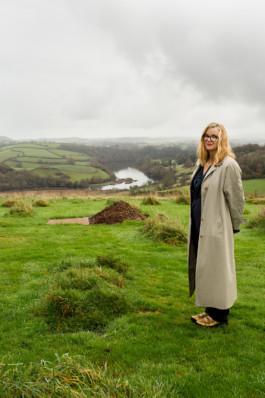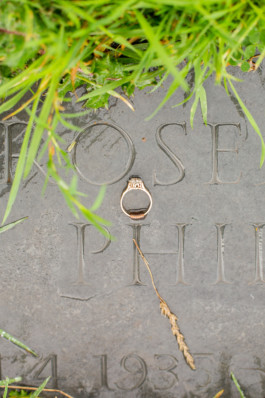Claire: “Dying is hard. It’s hard work like birth is hard work”


listen:
Content warning: contains descriptions of death, dying and bereavement
Photography: Tim Mitchell
Audio Producer: Nada Smiljanic
read:
April. My mum died in April.
I have a ring, a diamond ring, that was her mum’s. Since she died I just constantly play with it and roll it around my finger. And I hold my hand away like a newly engaged bride to be and look at it. And I feel like an ancestor, you know – I feel like I’m at the end of this line of strong women and I’m wearing the ring. Yeah, it’s been really… it’s like a talisman.
My name is Claire Callender. I live in Totnes in Devon, and I am a ceremonial Undertaker and have been for the last 20 years.
The moment that I realised Covid was going to be so serious was when we went to lockdown. And we had no PPE. There was no PPE. And for the first few weeks, that was my job: I was literally sitting at my computer all day trying to source gloves and masks and body bags.
I couldn’t get body bags. We were having very sobering tours around the what they called TSUs – the temporary storage units. Massive, vast tented structures on the outskirts of cities where they could store thousands of bodies, where the security was really tight. I mean, they never got commissioned, thank goodness. But it was just – I had no idea how it was going to show up in my work. Whether I was going to be up to it, whether it was going to break me, whether it was going to be the most terrifying thing ever – and whether I’d have enough body bags.
Infection rates generally were low in Devon, and death rates were low in Devon, and we were very quiet in that first bit. We had no Covid deaths. But what happened is we were doing a number of funerals for people who were dying at home – elderly people surrounded by their extended families. So normally they would have, I suspect, gone into hospital and died in hospital. But because of Covid they weren’t. And because of lockdown, all their families were there; there were grandchildren there, their children were there. And they all nursed them through to their deaths together in this really beautiful way. And then we would go and collect them from their home. And some of them on Dartmoor were lucky enough to have their own land. And then we buried them on their own land, in this glorious sunshine.
For other families, again, the fact that there could only be 10, 12, 15, 30 – or whatever the number is – had been a gift. You could see people who were saying, ‘Oh my God, thank goodness, we don’t have to put on a big thing. It can just be us. We can just do something really intimate with just our family’. They felt that a stress had been lifted by not having to invite, you know, what would normally have been about, you know, maybe 60 or 70 people to the funeral.
But then for other people it was awful. There were some very sad funerals where there was just one woman and her son in the crematorium. They couldn’t celebrate their husband, dad, who was a very prominent figure and who would have had hundreds of people at his funeral. Yeah, and that was very heartbreaking.
And then, you know, there was my own mum’s funeral where, you know, none of my family could come. My eldest daughter was living with me during lockdown, but my youngest daughter, my two brothers, and my dad, were all on Zoom. And it was… yeah, it was horrible.
My mum had been getting progressively more disabled and ill and had gone into a nursing home in April. And then everything went into lockdown and nobody was allowed to visit her. So I’d have a daily Skype call with her where one of the nurses or care workers would be kneeling by her bed holding up an iPad and I would try and get her to make eye contact with me and she couldn’t really speak. On that last call, I just had you know that instinctive thing that that comes up and I was just saying to her it’s, you know, ‘It’s okay mum. If you need to go you can go. We’re all okay here. Just go. It’s alright. We love you. Just go’.
And after that call, she was taken back up to her room – because she was in the lounge. Someone went in to check on her an hour later, and she had died.
She had seen no friend or any of her family for three weeks, and she died completely alone.
As an undertaker, you do think about people dying and, obviously, your parents are going to die. And I, you know… I just wanted to be with her. You know, your mum gives birth to you and I… my feeling was that I could just help her die, you know, because dying is hard. It’s hard work like birth is hard work. And it’s – my feeling is it’d be really good to have someone with you who loves you.
In normal circumstances, I would have made a lovely funeral for her in her hometown of Minehead and hundreds of people would have come. And it would have been exactly what she wanted. I was completely cheated of that by Covid. I mean, I was very lucky. I was able to go and collect her because I’m an undertaker. I went with my friend that night. And we went and picked her up and brought her back to Devon.
Her grave is near me. And it’s in a stunningly beautiful natural burial ground. It’s overlooking this beautiful aspect of the River Dart and it faces East, so I often go up there at dawn and sit on her grave as the sun comes up and do a bit of yoga. That’s been really helpful.
An Empathy Museum project made with the support of NHS England and NHS Improvement, The Health Foundation, and Arts Council England